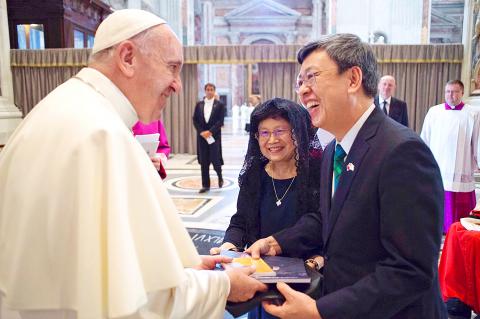Diplomatic relations would not be addressed in an agreement between China and the Holy See that is reportedly ready to be signed before the end of the month to settle a long-standing dispute over the nomination of bishops, a US Jesuit magazine reported on Tuesday.
The question “was not raised in the present negotiations with Beijing, nor was the question of the Holy See’s relations with Taiwan,” reported America, citing sources with knowledge of the matter.
The Holy See is Taiwan’s only diplomatic ally in Europe.

Photo: CNA, courtesy of the Embassy of the Republic of China to the Holy See
Taiwan has lost five allies since President Tsai Ing-wen (蔡英文) took office in May 2016, as China has stepped up its suppression of Taiwan’s international presence in response to Tsai’s cross-strait stance.
Amid media speculation over the content of the agreement, which reports say could lead to the Holy See establishing diplomatic ties with Beijing, the America report cited Vatican sources as saying that the deal would bring together China’s state-backed and unauthorized Catholic communities.
A high-level Vatican delegation is to travel to Beijing for the signing, the magazine said, adding that a date has already been fixed.
“The agreement only deals with the question of the nomination of bishops. It gives each side a say in the selection of candidates, but it recognizes that the pope will have the final word in the appointment of bishops for the Catholic Church throughout mainland China,” the report said.
China and the Holy See consider it “a provisional agreement” to be revisited in a few years, it said.
The Holy See recognizes that it is “not a good agreement,” but believes “it is the only one possible at present and that, in a small, but highly significant way, it opens the door to developing a constructive and improving dialogue with the world’s emerging superpower,” the magazine said.
The report said that the text of the agreement would not be made public, even after it has been signed.
In contrast, a report by the Global Times, a newspaper owned by the Chinese Communist Party’s People’s Daily, on Tuesday quoted the agreement as saying that “future bishops in China should be approved by the Chinese government and mandated by the pope and the letter of appointment would be issued by the pope.”
Citing Francesco Sisci, a senior researcher at the Center of European Studies at China’s Renmin University, the Global Times said that the agreement “would be rather broad on the church in China and should also include provisions for future talks and changes.”
The agreement is the result of negotiations that were revived after Pope Francis took over in March 2013, America said, adding that the administration of US President Donald Trump is not happy with the agreement, a position shared by the US Catholic Church and others.
“They see it as weakening the struggle for religious freedom in China and point to the crackdown on religion in that country in recent months under [Chinese] President Xi Jinping [習近平],” the magazine said.

AGING: As of last month, people aged 65 or older accounted for 20.06 percent of the total population and the number of couples who got married fell by 18,685 from 2024 Taiwan has surpassed South Korea as the country least willing to have children, with an annual crude birthrate of 4.62 per 1,000 people, Ministry of the Interior data showed yesterday. The nation was previously ranked the second-lowest country in terms of total fertility rate, or the average number of children a woman has in her lifetime. However, South Korea’s fertility rate began to recover from 2023, with total fertility rate rising from 0.72 and estimated to reach 0.82 to 0.85 by last year, and the crude birthrate projected at 6.7 per 1,000 people. Japan’s crude birthrate was projected to fall below six,

Conflict with Taiwan could leave China with “massive economic disruption, catastrophic military losses, significant social unrest, and devastating sanctions,” a US think tank said in a report released on Monday. The German Marshall Fund released a report titled If China Attacks Taiwan: The Consequences for China of “Minor Conflict” and “Major War” Scenarios. The report details the “massive” economic, military, social and international costs to China in the event of a minor conflict or major war with Taiwan, estimating that the Chinese People’s Liberation Army (PLA) could sustain losses of more than half of its active-duty ground forces, including 100,000 troops. Understanding Chinese

SELF-DEFENSE: Tokyo has accelerated its spending goal and its defense minister said the nation needs to discuss whether it should develop nuclear-powered submarines China is ramping up objections to what it sees as Japan’s desire to acquire nuclear weapons, despite Tokyo’s longstanding renunciation of such arms, deepening another fissure in the two neighbors’ increasingly tense ties. In what appears to be a concerted effort, China’s foreign and defense ministries issued statements on Thursday condemning alleged remilitarism efforts by Tokyo. The remarks came as two of the country’s top think tanks jointly issued a 29-page report framing actions by “right-wing forces” in Japan as posing a “serious threat” to world peace. While that report did not define “right-wing forces,” the Chinese Ministry of Foreign Affairs was

US President Donald Trump in an interview with the New York Times published on Thursday said that “it’s up to” Chinese President Xi Jinping (習近平) what China does on Taiwan, but that he would be “very unhappy” with a change in the “status quo.” “He [Xi] considers it to be a part of China, and that’s up to him what he’s going to be doing, but I’ve expressed to him that I would be very unhappy if he did that, and I don’t think he’ll do that. I hope he doesn’t do that,” Trump said. Trump made the comments in the context